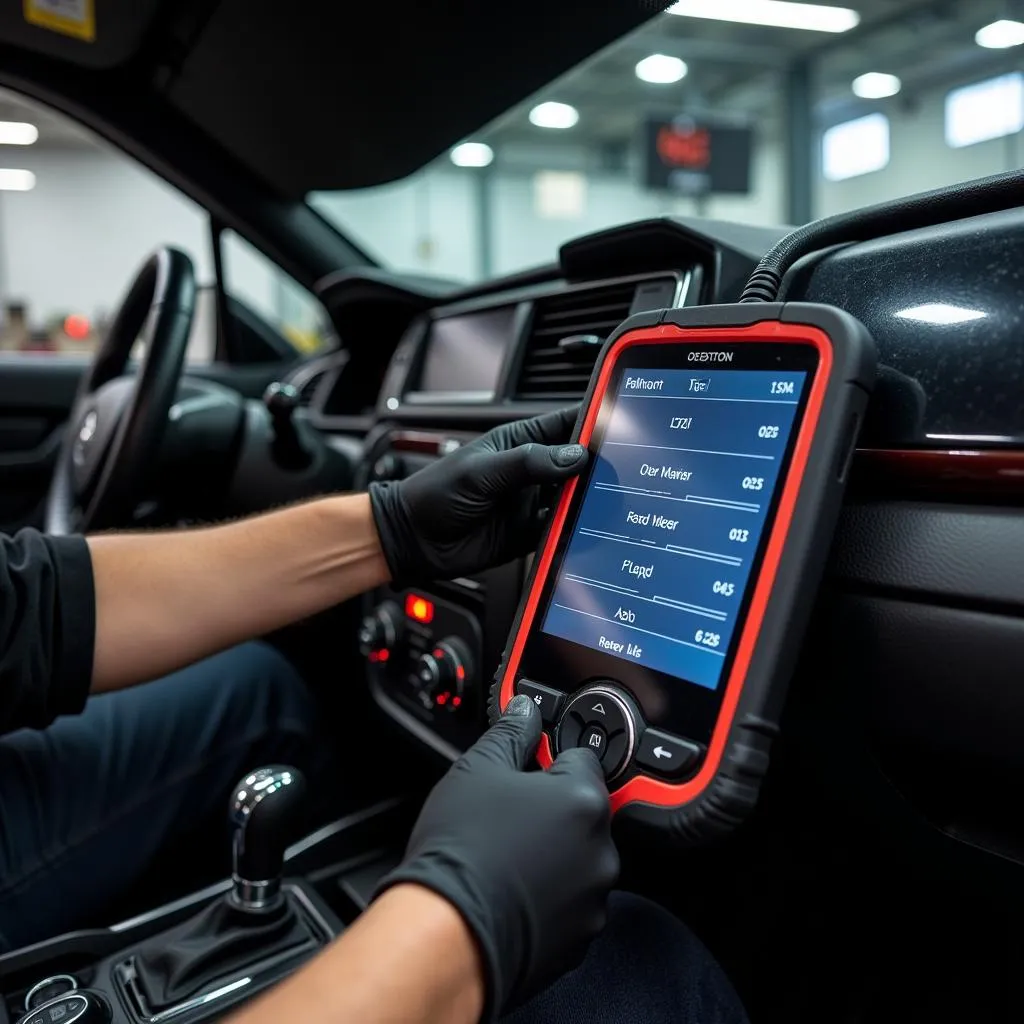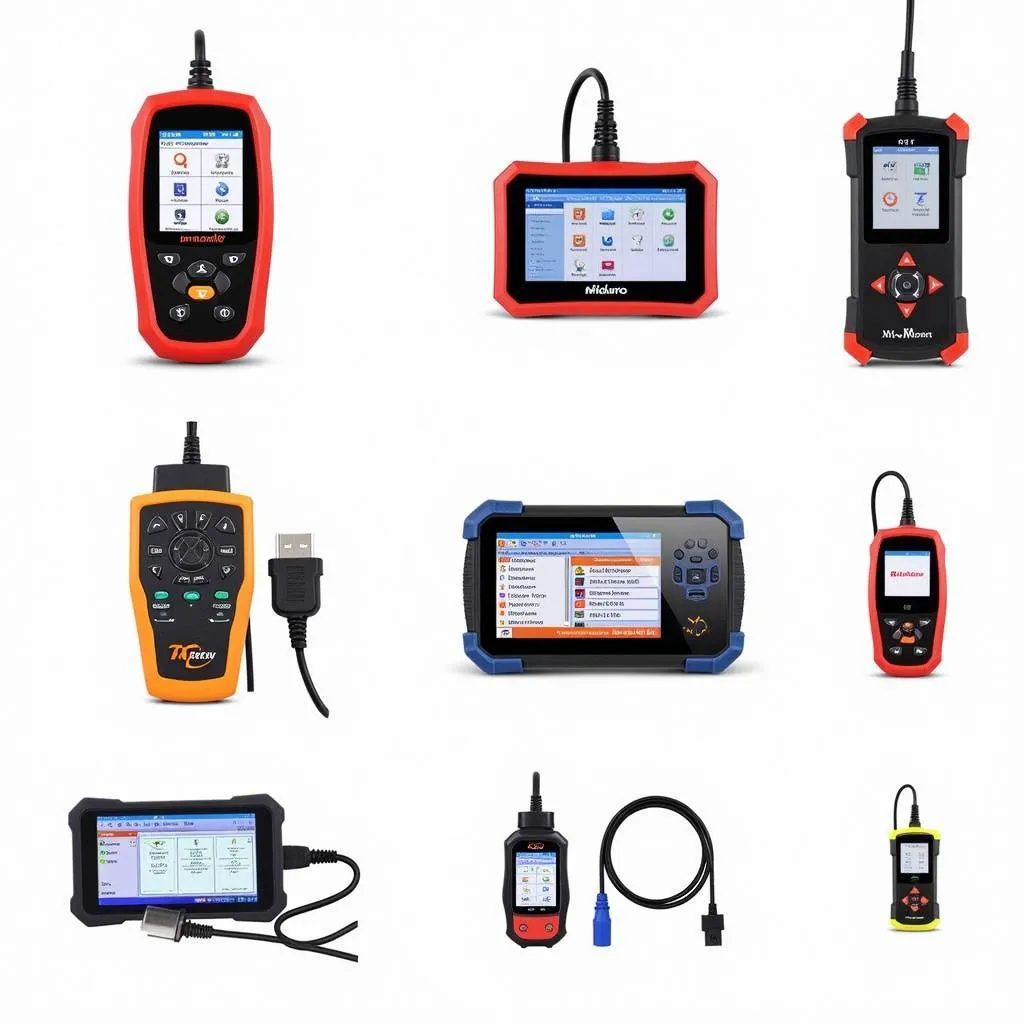The world of automotive repair has evolved rapidly in recent decades, moving away from rudimentary tools and guesswork toward sophisticated car auto diagnostic tools and data-driven diagnostics. These tools, essential for mechanics and car enthusiasts alike, provide an in-depth look into your vehicle’s electronic systems, revealing problems that traditional methods might miss. This comprehensive guide will explore everything you need to know about car diagnostic tools, from understanding their functions to choosing the right one for your needs.
 Mechanic using car diagnostic tool
Mechanic using car diagnostic tool
What are Car Auto Diagnostic Tools and Why Do You Need One?
At their core, car auto diagnostic tools are sophisticated electronic devices designed to communicate with your vehicle’s onboard computer system, often referred to as the Engine Control Unit (ECU). The ECU is essentially your car’s brain, constantly monitoring and controlling various systems like engine performance, emissions, transmission, and more.
When a problem arises, the ECU generates error codes that provide clues about the underlying issue. Automated diagnostic tools act as translators, reading these codes and presenting them in a user-friendly format. This allows you to pinpoint the source of the problem instead of relying on guesswork, saving time and potentially costly misdiagnoses.
Types of Car Auto Diagnostic Tools
The market offers a wide range of diagnostic tools, catering to various budgets and skill levels.
1. Basic Code Readers:
Ideal for car owners who want to perform simple diagnostics, these affordable devices can read and clear basic error codes. However, they often lack advanced features like live data streaming or actuation tests.
2. OBD-II Scanners:
Automotive diagnostic tools that utilize the standardized On-Board Diagnostics II (OBD-II) port found on most cars manufactured after 1996. These scanners offer more advanced functionalities, including reading and clearing codes, viewing freeze frame data, and monitoring live sensor data.
 Various car diagnostic scanners
Various car diagnostic scanners
3. Professional Auto Scan Tools:
As the name suggests, professional auto scan tools are geared towards mechanics and professional technicians. These tools offer a comprehensive suite of features, including advanced coding, programming, bi-directional communication with the vehicle’s ECU, and access to manufacturer-specific data.
Key Features to Consider
When choosing a car auto diagnostic tool, several factors come into play:
- Vehicle Compatibility: Ensure the tool is compatible with your vehicle’s make, model, and year. Some tools specialize in certain manufacturers, while others offer broader compatibility.
- Functionality: Determine the features most important to you. Basic code reading might suffice for casual users, while professionals require advanced features like ECU coding and programming.
- User Interface: Opt for a tool with an intuitive and user-friendly interface, especially if you’re a beginner. Look for features like a clear display, logical menu navigation, and helpful on-screen guidance.
- Data Logging and Reporting: The ability to log data and generate reports can be invaluable for tracking problems over time or sharing information with a mechanic.
- Updates and Support: Regular software updates are crucial for maintaining compatibility with new vehicle models and fixing potential bugs. Ensure the manufacturer offers reliable technical support and resources.
Benefits of Using Car Diagnostic Tools
The benefits of incorporating car auto diagnostic tools into your maintenance routine are numerous:
- Early Problem Detection: By identifying issues in their early stages, you can often prevent minor problems from escalating into major (and expensive) repairs.
- Cost Savings: Diagnosing problems yourself can save you significant money on diagnostic fees charged by mechanics.
- Increased Vehicle Lifespan: Regular diagnostics and timely repairs contribute to a longer and healthier lifespan for your vehicle.
- Enhanced Performance: By monitoring live data, you can identify potential issues that might be affecting your vehicle’s performance.
- Peace of Mind: Having a diagnostic tool on hand provides peace of mind, knowing you can quickly and easily assess warning lights or unusual vehicle behavior.
Common Uses of Car Auto Diagnostic Tools
Car auto diagnostic tools have a wide range of applications, including:
- Reading and Clearing Error Codes: The most common use, allowing you to decipher the meaning behind those cryptic dashboard warning lights.
- Live Data Monitoring: Observe real-time data from various sensors, like engine RPM, coolant temperature, and oxygen sensor readings.
- Component Activation: Test individual components like actuators, solenoids, and relays to ensure they’re functioning correctly.
- ECU Coding and Programming: Advanced users can modify vehicle settings, update software, and even program new keys.
- Emissions Testing: Some tools can assist in diagnosing emissions-related problems, helping you prepare for state inspections.
Future Trends in Car Diagnostic Technology
The world of car auto diagnostic tools is constantly evolving, driven by advancements in automotive technology and connectivity.
- Wireless Connectivity: Launch automotive scan tools that connect wirelessly to your smartphone or tablet via Bluetooth or Wi-Fi are becoming increasingly popular, offering greater convenience and portability.
- Cloud-Based Diagnostics: Cloud platforms allow for data sharing, remote diagnostics, and access to vast databases of repair information and technical support.
- Augmented Reality (AR) and Virtual Reality (VR): AR and VR technologies are beginning to integrate with diagnostic tools, providing immersive and interactive repair guidance.
Conclusion
Investing in a car auto diagnostic tool is a wise decision for any car owner or enthusiast. These tools empower you to take control of your vehicle’s maintenance, save money on costly repairs, and ensure optimal performance. By understanding the different types of tools, their key features, and the benefits they offer, you can make an informed decision and choose the perfect car diagnostic tool to meet your specific needs.
FAQs about Car Auto Diagnostic Tools
1. Can I use any diagnostic tool on my car?
No, not all diagnostic tools are universally compatible. It’s crucial to choose a tool that supports your vehicle’s make, model, and year.
2. What is the OBD-II port and where can I find it?
The OBD-II port is a standardized 16-pin connector typically located under the driver-side dashboard.
3. Do I need to be a mechanic to use a car diagnostic tool?
Basic code readers are relatively user-friendly, even for beginners. However, more advanced tools might require some technical knowledge.
4. Can I damage my car by using a diagnostic tool incorrectly?
While it’s unlikely to cause damage by simply reading codes, it’s essential to exercise caution when accessing advanced features like ECU programming.
5. What should I do if my car diagnostic tool can’t solve the problem?
If the tool identifies a complex issue or you’re uncomfortable attempting the repair yourself, it’s always best to consult a qualified mechanic.
Considering car diagnostic tool rental?
Renting a car diagnostic tool can be a cost-effective solution for one-time use or trying out different tools before making a purchase.
Need further assistance?
Contact our dedicated customer support team via WhatsApp: +1(641)206-8880, Email: [email protected] or visit us at 276 Reock St, City of Orange, NJ 07050, United States. We are available 24/7 to assist you.
Explore more informative articles about automotive diagnostic tools on our website.